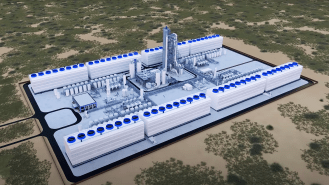Direct air capture is a worthwhile investment, according to money manager BlackRock, which just invested more than half a billion of its clients’ dollars in the world’s largest facility for pulling carbon out of the atmosphere.
Direct air capture 101: According to climate experts, reducing our greenhouse gas emissions won’t be enough to prevent the worst predicted effects of climate change — we must also remove some of the carbon dioxide (CO2) we’ve already released into the atmosphere.
It costs up to $1000 to remove a ton of CO2 at an existing direct air capture system.
Direct air capture systems are one way to do this. These machines suck in air from the atmosphere, extract the CO2 molecules from it, and then release the rest of the air back into the environment. The CO2 can then be stored underground.
While we know these machines work, CO2 accounts for just .04% of our air, and extracting it from the other 99.96% is an expensive feat of engineering — as of May 2023, it still cost an estimated $600-$1000 to remove a ton of CO2 at an existing direct air capture system.
STRATOS: Scaling up direct air capture systems could lower the per-ton cost, and in April 2023, 1PointFive — a subsidiary of Occidental Petroleum focused on carbon capture tech — broke ground on the world’s biggest direct air capture facility, called STRATOS, in Ector County, TX.
Once fully operational, STRATOS will be able to remove 500,000 tons of CO2 from the air annually, according to 1PointFive. For comparison, all of today’s direct air capture facilities combined can remove just 10,000 tons of CO2 annually.
“This joint venture demonstrates that direct air capture is becoming an investable technology.”
Vicki Hollub
What’s new? STRATOS is expected to cost $1.3 billion, and 1PointFive has been hunting for investors for the project since 2022, according to Reuters. It’s now found a major one in BlackRock, one of the world’s biggest asset management companies.
BlackRock has agreed to invest $550 million of its clients’ money into STRATOS, and the two companies have agreed to form a joint venture for the project, meaning BlackRock will be a part owner in it.
“This joint venture demonstrates that direct air capture is becoming an investable technology,” said Occidental’s CEO Vicki Hollub. “BlackRock’s commitment in STRATOS underscores its importance and potential for the world.”
Looking ahead: Construction on STRATOS is reportedly 30% complete, and 1PointFive expects the plant to be operational by mid-2025. Once that happens, the company expects to make money through the sale of carbon credits.
Two partners, Amazon and Airbus, have already pre-purchased credits paying for the extraction and storage of 250,000 and 400,000 metric tons of CO2, respectively, over the course of several years.
It’s not clear when STRATOS is expected to be operating at full capacity, but more than 65% of its capacity through 2030 has already been sold, according to Occidental.
Thinking big: If everything goes as planned with STRATOS, Occidental hopes to turn it into something like the McDonald’s of direct air capture facilities — on November 8, Hollub told investors that the goal is to license the tech to partners, who could then build and operate their own plants.
“Instead of expecting to build 100 of these, then we can start to get into the hundreds of them and potentially the thousands that are going to be needed to be built,” she said.
We’d love to hear from you! If you have a comment about this article or if you have a tip for a future Freethink story, please email us at [email protected].






